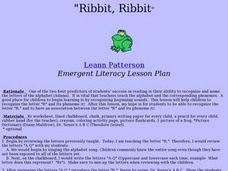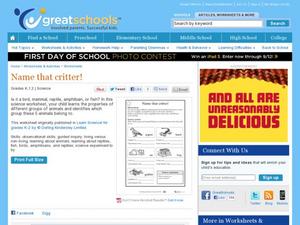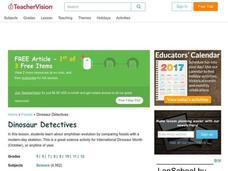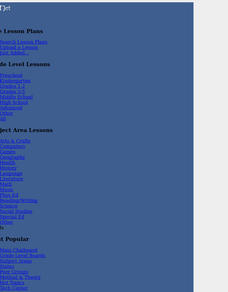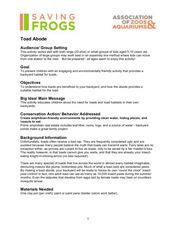Curated OER
AMPHIBIAN RESPIRATION
Students describe the structural differences in the respiratory systems of aquatic and terrestrial vertebrates and explain the motivation for these structural adaptations in reference to the differences in habitat.
Curated OER
Who am I?
Here's a worksheet that has a variety of animals pictured. Learners must cut and paste the correct name and glue it in the box with the pictured animal. Great for young learners. An answer key is included on the worksheet.
Curated OER
Scales, Scutes, and Skins
Students identify the various adaptations of reptiles and amphibians. After distinguishing between reptiles and amphibians, students discuss the ways in which their adaptations aid in their survival. They participate in a hands on...
Curated OER
Holy Habitats or Meet Metamorphosis
Students examine the metamorphosis of frogs and how it adapts to its environment. They research how world pollutants are effecting the amphibian population.
Curated OER
How Do Animals Change as They Grow?
This PowerPoint includes text, diagrams, and clip art describing characteristics of a tadpole as it changes into a frog, as well as a description of the related life cycle stages. Although the title indicates the broader theme of...
Curated OER
Connect the Dots
In this connect the dots worksheet, students connect the dots to link the numbers to reveal an amphibian that is known for its call.
Curated OER
Which Animals Are Vertebrates?
In this vertebrate animals worksheet, students will classify 5 animals as belonging to the bird, mammal, reptile, amphibian, or fish group.
Curated OER
Creatures of the Grand Canyon
In this word search puzzle worksheet, students find and circle all of the wildlife hidden in a word search puzzle. Students also classify the animals into groups of mammals, birds, fish, reptiles, or amphibians.
Curated OER
Amphibians
Fourth graders Make flashcards for the following words, memorize them and get quizzed by the teacher: Amphibian, Lungs, complete metamorphosis, tadpoles, tail-less, tail, vertebrate, cold-blooded, gills, swamp, pond.
Curated OER
Tadpole Diary
Second graders examine the life cycle by observing tadpoles. After reading the book, Tadpole Diary, they draw the stages of tadpole development and write sentences about what they think is happening.
Curated OER
Ribbit! Ribbit!
Students research a frog's life cycle and habitat using books, the Internet and lecture. Students make origami frogs, write letters to Toad from Arnold Lobel's "Frog and Toad" and participate in a simulated camouflage activity.
Curated OER
Why Care About Amphibian Population Decline and Malformations?
Students examine the reasons for preserving wildlife. They look at reasons for amphibian malformations and write an essay about the ethical issues that this brings up. They listen to the teacher read quotes about extinction and how the...
Curated OER
Name That Critter
Young learners classify five different animals into their proper category. The animals pictured are a pigeon, a lizard, a cat, a frog, and a goldfish. Pupils are also asked to tell why they know it's a certain kind of animal. An...
Curated OER
Dinosaur Detectives
Students examine amphibian evolution by comparing fossils with a modern-day skeleton. They experience the scientific thought process of drawing conclusions from limited paleontological data. Student groups align the figures with the...
Curated OER
Migration Woes
Students are able to describe the reproductive cycle of the gopher frog. They are able to describe the impacts of habitat loss and degradtion on gopher frog populations. Students are explained that many factors limit the survival of...
Curated OER
Sunken Millions
This PowerPoint features a game based on the animal life. The interactive slides include 20 questions about animal needs, animal groups, and animal traits. The questions include multiple choice answers and 4 different levels of...
Curated OER
Class Amphibia Concept Map
In this class amphibia worksheet, students complete the concept map using words or phrases provided. They fill in 11 blanks with the correct answers.
Curated OER
Crocodile Eyes
Young scholars investigate the eyes and eyelids of reptiles and amphibians. For this animal biology lesson, students listen to a lecture on the characteristics of amphibians and reptiles and complete a crocodile eyelid activity sheet.
Curated OER
What Kind of Animal Are You?
With the descriptions of six different animal groups (amphibians, birds, fish, insects, mammals, reptiles), students match different examples of animals to their proper groups (lizard to reptiles, girl to mammals, etc). The activity...
EngageNY
Mid-Unit Assessment: Close Reading of the "Spadefoot Toad"
A mid-unit assessment challenges scholars to use their close reading skills to identify the main idea and key details. After reading a brief excerpt, learners answer a series of questions—multiple-choice, short answer—complete a graphic...
Curated OER
Toad Adobe
Learners explore the importance of toads and the need for toad habitats in the environment. For this animal habitats lesson, students create an adobe habitat for toads by using a clay pot. Learners paint their pots and place them in...
Curated OER
Mapping Where Animals Live
In this animal mapping worksheet, students read a short passage about amphibians and reptiles in New York State, then use a set of maps to answer related questions.
Curated OER
Biodiversity in Illinois-Pond Habitats
Second graders construct a pond habitat in the classroom using a small swimming pool partially filled with water, real cattails, a tree log adjoining, and plastic animal life appropriate to a pond setting. They examine the frog in detail...












